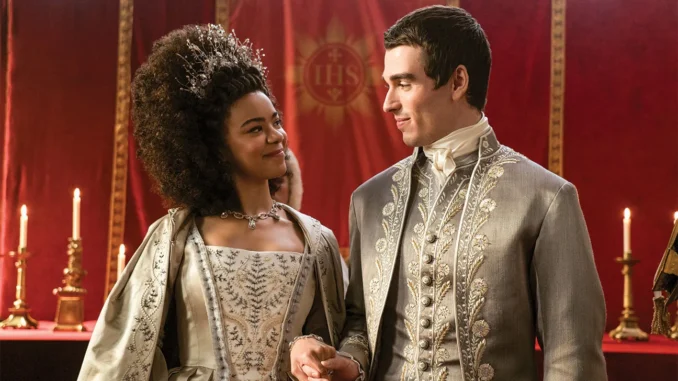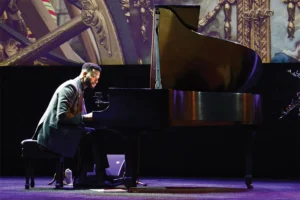
Four-time Emmy-nominated composer Kris Bowers returns to the ‘Bridgerton’ universe for its prequel series.
Bridgerton composer Kris Bowers is back for its spinoff drama series Queen Charlotte: A Bridgerton Story, which delves into the life and rise to power of, well, Queen Charlotte. With its exploration of mental illness and fitness to rule, the show is tonally much darker than its predecessor, says Bowers, which provides its own set of challenges in composing the score.
“One of the things that I really gleaned, even from my first read of the scripts, was just how much it felt more grounded than Bridgerton. It tonally feels a bit more serious and intimate because we’re very relationship dealing with Charlotte and this [with King George],” Bowers tells The Hollywood Reporter of the royal couple loosely based on the mid-18th century’s Queen Charlotte of Mecklenburg- Strelitz and King George III.
The composer spoke about which instruments he used, his preparation for this show and whether there was a scene that was harder to compose than others.
Was there a specific scene or part of the score that was more difficult to compose?
The opening, just because it was the first cue that I wrote, and it was really just setting the tone for how this show would feel a bit different from Bridgerton. That was one that took a handful of attempts at finding something that really felt like it was the sound of this show. So often, the first piece of music for a show is the most challenging because of that effort to find the palette and sound, and so that was the challenge there. Other than that, there’s the sequence where Charlotte finds George in the garden in the middle of the night and he’s talking to the stars … I think that [cue], just in terms of scope and length and trying to find a way to marry some of their themes with this new awareness of what’s going on with him mentally, was probably one of the more challenging cues, as well.

I also want to talk about the opening credits. It’s much shorter and quicker in pace than Bridgerton‘s, and tonally it’s different. What was the process behind this?
That was a challenge as well, because I tried a few different iterations on Charlotte’s theme and iterations on their love theme. Part of the challenge with the main credits was that so much of the score for the show has a darker feeling to it. Obviously, there’s this love story, and so there are moments of deep romance and all of that, but there’s so much darkness in the score that a lot of repurposing of cues in the score for the main titles just felt like it set the tone a little too dark and ominous for the show. It was a matter of trying to find things that rhythmically had the energy that we wanted in terms of tempo and pace, but at the same time were still connected to their themes.
Did that thought process bleed into the rest of your score?
Yeah, for sure. For this, I started with the score for the show — I didn’t actually write the main titles until almost at the very end. We were almost done with the very last episode before I actually wrote the main titles, so I was quite steeped in the weight and darkness of the show. But I did also have a very specific palette that had been developed that was helpful to carry into the main titles even if, tonally, it felt like a fresher thing. I would say it was kind of the inverse. It was like carrying the things that I had discovered and developed over the course of scoring the show that really informed the main title.
Was the preparation for Queen Charlotte different from that process in your previous work?
Yeah, it was a lot more research on her and her story during that time period, but also research on music that had the feeling that I was looking for. I was really fascinated by her story and her relationship with King George, but also specifically the actual real-life theory that she is of African descent — so much of that felt really interesting to explore. But then, doing more research about her and where she was from led me to decide to use fortepiano for the piano whenever we’re in young Charlotte’s time, versus regular piano when we’re in the Bridgerton version of Queen Charlotte that we know, just to have a very specific sound that feels a little bit more tied to her period.
[Music supervisor] Alexandra Patsavas and I spoke a lot about Black composers and composers of color in that time period as well, and she shared with me a lot of music written by Joseph Bologne, Chevalier de Saint-Georges. And I reliably had been tapped to work on a movie about him at the same time [Chevalier, directed by Stephen Williams], so I did a lot of research on him, and some of the music is inspired by him as well. We talked a lot about this imagined idea that Charlotte would have known [this] Black, prolific musician making music in this time period.